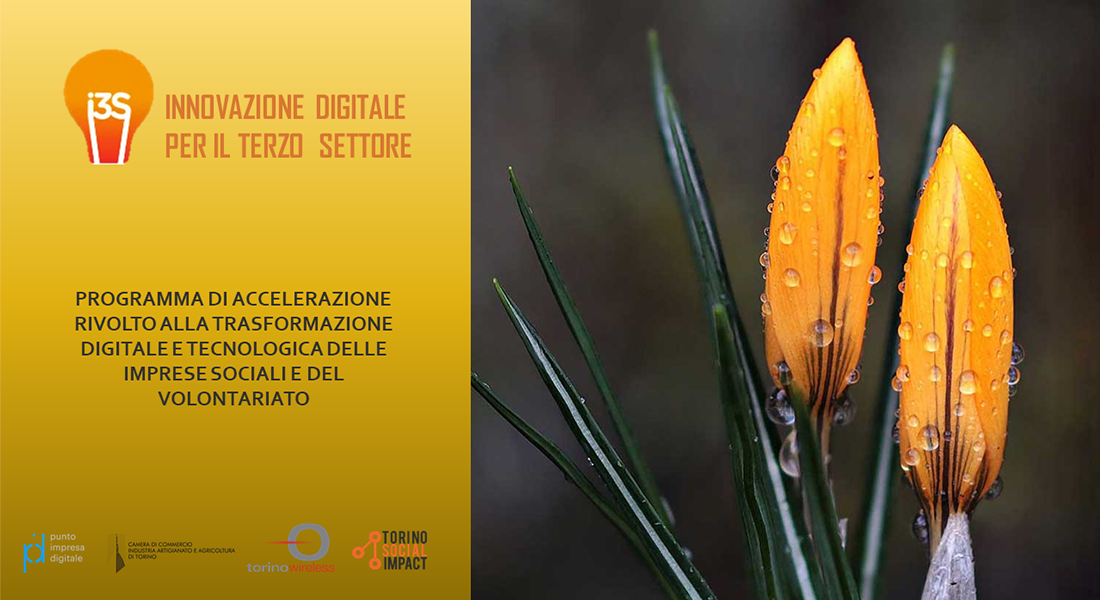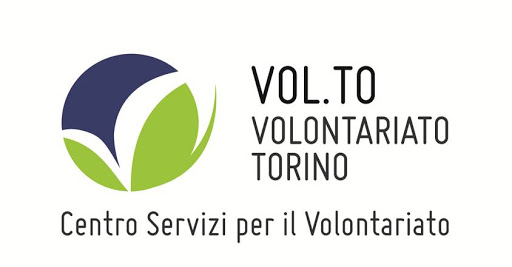The I3S project-Digital Innovation for the Third Sector-began as an idea from Fondazione Piemonte Innova (formerly Torino Wireless) in March 2020 in the midst of lockdown, and pursues the goals of the Tech4Good Program of the Torino Social Impact Strategic Plan, which identifies innovation and digital as the main lever of third sector development.
It relies on close collaboration with the Social Entrepreneurship Committee of the Chamber of Commerce, and, in particular, the Representative Bodies of the Project beneficiaries-Confcooperative Piemonte Nord, Legacoop Piemonte, and the Volunteer Service Center VOL.TO-are active participants with their Innovation Managers, and are the key players in the dissemination and implementation of experimentation and modeling.
The activities of the I3S project took place over the course of two years, during which important results were achieved in pursuit of the goals of the Tech4Good strategy.
FIRST ANNUALITY
- Mapping of market solution providers, with detailed fact sheets: analysis of the national ICT ecosystem, looking for those market players that offer technological solutions and services compatible with the Third Sector’s digital transformation needs
- Mapping of services for the Third Sector that have already been put in place or can be activated primarily by the Stakeholder Group referents
- Mapping the Third Sector’s digital transformation needs
- Activation of a Digital 4 Social Chain within the regional ICT Innovation Cluster, which includes 20 technology companies, with a mosaic of as many 20 solutions, and is being continuously updated
- Measurement and monitoring of Impact indicators-in collaboration with TSI and Tiresia-with a methodological approach based on the Theory of Change to identify impacts in the I3S project value chain
- Sharing an Idea Bank with the identification of 10 innovative ideas and 6 possible paths of digital transformation
SECOND ANNUALITY
The second year, which ended in March 2023, was a significant and necessary step in grounding the ideas collected. Moving from ideas to projects and from projects to services and working on new professional profiles was helpful in fostering the transition to digital of the ETSs involved in the project.
Three lines of intervention were implemented in this second year: accompanying digital innovation for new models of sustainability, accelerating awareness and capacity to govern digital transformation, and consolidating networking activities between ETSs and ICTs.
Innovation
Innovation activity was carried out through three LIVING LABs focused on themes that emerged from the light of the Idea Bank in the first year:
- Re-engineering of the “Vol.To – Volontariato Torino” platform to intersect supply and demand for volunteering and social services.
Analysis of the system currently in use, profiling of stakeholders and users to identify needs and opportunities, and benchmarking of similar systems to identify good practices and distinctive elements were carried out.
The result was the proposed use case and functional requirements for the platform, which led to the transformation of data into content, thanks to the redesign of the bulletin board and calendar, and the introduction of a section dedicated to the presentation of associations, a volunteer page with integrated functions and news, and association matching functions. In addition, new services were introduced: the shopping cart to “buy” services, the community engagement tool, basic training modules, and the forum that expands the bulletin board’s functionality. - Design of simulation/gaming models of residential solution and services for frail people. Together with the ETSs “Crescere Insieme Cooperativa Sociale” and “Il Margine,” work was done to identify tools and models that exploited Digital Twin and Virtual Reality technologies to simulate the placement of frail people (elderly and minors with specific pathologies, such as autism, etc.) within new environments, such as nursing homes, communities, and accommodations for people with disabilities.
The goal achieved was to develop a pre-proposal for the development of a research and innovation project to be submitted on possible funding opportunities dedicated to research and development. But the project went far beyond the writing of the pre-proposal: it was applied on several calls for proposals from the Turin Chamber of Commerce, on the HST – Human Science and Technologies infrastructure of the University of Turin, and on Google calls. After being positively evaluated, it was able to start work, which will last from April to October 2023. Read the in-depth article. - Reengineering of current home care intake services, with a view to greater innovation. The goal, directly shared with the entities currently involved in the services (Confcooperative Piemonte Nord, Assiste, Legacoop and La Valdocco) is to improve the user experience, delivery methods and suggest future developments through the application of innovative ICT technologies and solutions. In short, a kind of low-tech technology transfer. The proposed evolutionary proposal emerged from the evaluation of an example technology configuration and the production of an analysis and comparison report with similar exemplary cases. The result was the activation activation of a round table discussion with the PA to initiate dialogue among the actors involved.
Acceleration
The Acceleration of Awareness and Ability to Lead Digital Transformation activity was carried out through:
- Identification of the professional figures, with business and social skills, most indispensable for third sector entities interested in activating a strategic path to increase the digital competencies of their organization, including through the acquisition of young and “smart” figures. The I3S project identified ten job descriptions on four areas of specialization: Operations and Service Delivery, Knowledge & Expertise, Communication, and Sustainability. Read the in-depth article
- Design, planning and delivery of accompanying services on digital innovation for 15 ETSs. The pilot project started on Feb. 6 with a wide range of services distributed among the actors in the area, aggregating the services already available provided by the representative bodies and the expanded network of project partners, in particular Piemonte Innova, Confcooperative Piemonte Nord, Links Foundation and Legacoop Piemonte. ETSs were able to choose from a number of services: consulting on service organization and optimization of processes, systems and people; service design; optimization of currently active services; basic literacy workshops; and introductory paths to Office Automation and Microsoft technologies-both more commonly used, such as Office 365, and for more sophisticated uses, such as Microsoft Power Apps, Power BI, Power Platforms and Azure. In addition, ETSs were able to take advantage of mentors on ICT topics and to identify funded opportunities for digital innovation, and conduct assessments on cybersecurity and GDPR. Finally, important support included recruiting and onboarding young professionals from the digital world or working with thesis and PhDs, who can be useful to organizations and help them grow over the long term. Read the in-depth article
Networking
To consolidate networking activities and broaden the target audience, the project worked closely with Torino Social Impact. Among the activities carried out:
- Organization and participation in 4 open events innovation themes oriented to specific topics and needs of the Third Sector
- Organization 2 “Research Meetings” open to ETS, ICT companies and research organizations
- Organization of meetings and workshops with PA to present digitally driven social innovation
- Supporting research Millennials and Gen-Z: what is your experience in the Third Sector?
Modeling
At the conclusion of the project, the model and methodology were formalized for complete replicability and scalability:
- Valuing with a data-driven approach the qualitative analyses, data collected and findings from the co-design and living lab activities
- Collection of recommendations for a subsequent extended validation phase of the model
- Engineering of the proposed model for future pathways that can be activated in our territory by the various entities working in this area
RECOMMENDATIONS
At the conclusion of this two-year experience, the project team gathered suggestions and best practices to keep in mind for the future:
- Invest in innovation management skills, trying to attract young and qualified staff
- Develop new hybrid professional figures (humanities + polytechnics)
- Train in innovation, strategic approach and change management
- Train and update the skills of all staff from a digital perspective, preparing them to use basic but up-to-date operational tools
- Foster Open Innovation with exchange groups, both within, and outside the organization
- Invest in modern, newly developed and long-lived technology solutions
- Compare experiences outside the usual network of actors
THE NUMBERS OF THE TWO YEARS
- Enterprises engaged: 44 ETSs and 35 ICTsTechnology Demand Definition: 16 ETSs interviewed
- Digital 4 Social supply chain: 30 Companies Enrolled, 32 Solutions Uploaded
- Working Tables held: 5 on different key issues, one involving PA (City of Turin and ASL)
- Innovative technological solutions for the third sector generated: 16 ideas collected in the idea bank
- Development and experimentation in Living Lab: 1 PoC, 2 Projects in implementation
- Innovative Social Job Descriptions defined: 10 in 4 different categories
- Individual mentoring hours provided: +75 hours for 33 entities
- Communication/Dissemination: 8 thematic discussion events on digital innovation topics, including:
Corporate Meeting to match supply and demand for solutions: 1 Event, +150 B2B meetings organized
Research Meeting with universities and research centers: 2 events, 60 B2B organized 12 candidate projects - Compilations collected from national Youth and Third Sector research: + 3000 Youth
THE GOVERNANCE OF I3S
The key players in this project were structured as follows:
- Fondazione Piemonte Innova (formerly Torino Wireless) is the implementing party
- Turin Chamber of Commerce is the funding entity and the Chamber of Commerce PID is the operational reference for the congruity of the actions with the chamber’s digital strategy
- Confcooperative Piemonte Nord, Legacoop Piemonte and VOL.TO make up, together with the Turin Chamber of Commerce, Torino Social Impact and Compagnia di San Paolo , the Stakeholder Group
- Confcooperative Piemonte Nord, Legacoop Piemonte and VOL.TO also actively participate in the identification of the group of subjects that make up the “pilot sample” of the living lab and provide innovation managers participating in the project team with Piemonte Innova
News and insights
News and insights
06.16.2023 – Virtual reality to support fragile individuals
14.03.2023 – The new digital professions to innovate the third sector
06.02.2023 – I3S accelerates digital transformation of the third sector: pilot project kicks off
19.10.2022 – Torino Wireless becomes Piemonte Innova
07.22.2022 – ICT and third sector companies meet the University of Turin: discover social impact technologies
12.07.2022 – Research Meeting of the ICT Cluster: “Technologies with social impact” – Sept. 14, 2022
31.07.2021 – Digital transformation and new business models for the third sector: the first year of the I3S project concluded
26.04.2021 – From data to knowledge: I3S goes live







